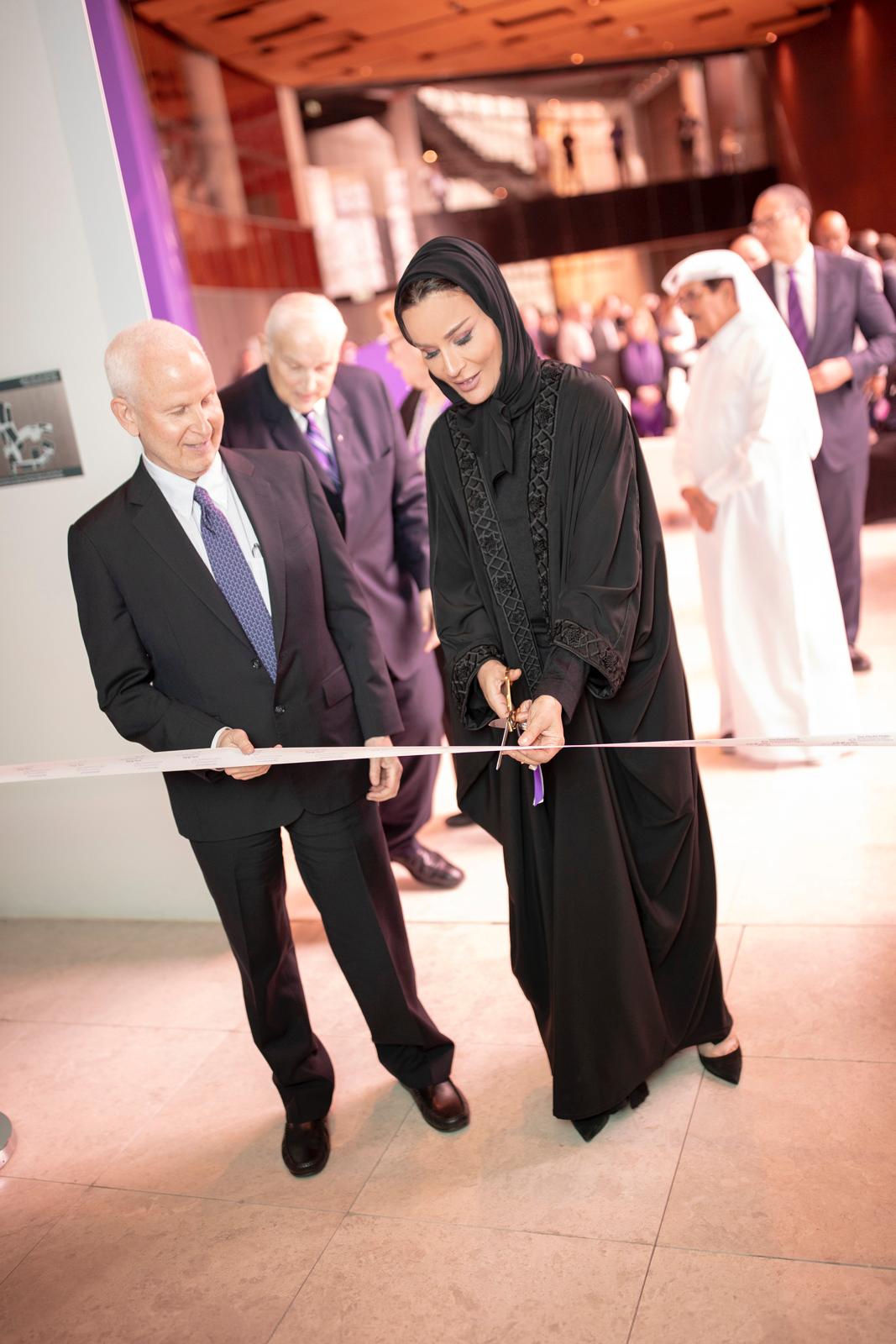Her Highness Sheikha Moza bint Nasser Officially Dedicates Region’s First Museum on Media
Her Highness Sheikha Moza bint Nasser, Chairperson of Qatar Foundation for Education, Science and Community Development (QF), officially dedicated The Media Majlis at Northwestern University in Qatar, a unique and interactive museum nestled in the heart of one of the largest and most advanced media schools in the world.
The colorful ceremony at the Qatar Foundation partner university was also attended by Her Excellency Sheikha Hind bint Hamad Al Thani, vice chairperson and CEO of Qatar Foundation, alongside dignitaries, Northwestern administration, and media professionals.
Speaking at the dedication ceremony, Her Excellency Sheikha Hind said: “At Qatar Foundation, we continue to be a platform for the expression and exploration of different ideas and perspectives, where people are encouraged to challenge the status quo through knowledge."
She added, “The Media Majlis demonstrates how narratives exist to be explored and challenged rather than simply accepted; and how connecting with different voices, standpoints, and ideas extends the boundaries of our understanding, nourishes critical and original thought, and enriches lives.”
Her Highness Sheikha Moza and Her Excellency Sheikha Hind toured the first exhibition, entitled “Arab Identities, images in film,” which provides an exploration of how over a century’s worth of film history has shaped and been shaped by notions of Arab identities.
The Media Majlis is the first museum of its kind in the region and the first university museum in Qatar. It is an active and empowering space where people can engage with the exhibition’s content and programs which focus on communication, journalism, and media in the Arab world; as well as contribute to the global conversation on the continually changing landscape of media.
In his remarks, Dean Everette E. Dennis noted that “The Media Majlis aims to foster public understanding of journalism and communication and their role in shaping public opinion and shaping the image of the Middle East to the rest of the world. It underscores the importance of media in society from the earlier and most basic forms of communication to the most modern and draws on images and materials from local sources and global collections.”
With a focus on the Arab world, the museum will host two exhibitions each year addressing major themes and ideas that are pertinent to the region. The museum features extensive digital-capacity creating exhibitions where visitors can participate through interactive commentary and engagement. Along with digital content shared using a number of different technologies, objects and other physical content feature to explore stories from multiple perspectives.
Speaking on the occasion, Morton Schapiro, president of Northwestern University said: “As a number of people have already pointed out, we wouldn’t be here without the ambition and generosity of Qatar Foundation 10 years ago, inspired by the vision of Her Highness Sheikha Moza bint Nasser.”
He added, “Who best to tell the story of media and journalism and communications in an Arab context than a museum located here in Northwestern University in Qatar. The Media Majlis demonstrates Northwestern’s commitment to education and research and its long-standing foothold in the Middle East.”
The museum’s first exhibition, Arab Identities, images in film, will continue until June 1 and then reopen in August and run through December. With sections from more than 60 films and hundreds of images, some that date back to the 1880s, and posters from the early 1990s visitors can bring nuance to the deep and complicated meanings of identity, as well as the ideas and connections that influence people’s understanding of that theme.
“The Media Majlis demonstrates how narratives exist to be explored and challenged rather than simply accepted; and how connecting with different voices, standpoints, and ideas extends the boundaries of our understanding, nourishes critical and original thought, and enriches lives.”
The director of the museum, Pamela Erskine-Loftus said, “Our ethos [at the museum] is that there is ‘always another side.’ Our exhibitions, complemented by a series of programs and publications, examine and discuss multiple angles and perspectives to provide audiences with a 360-degree engagement with the subject, leaving them more empowered and knowledgeable to make their own opinion on the subject at hand,” she explained.
The museum’s name draws on the traditional Arab majlis—or gathering place—as a vital source of interpersonal communication, but extends it to modern interactive media, thus connecting values of local culture to universal and global concerns.
Dean Dennis added, “the historic role of communication in the Middle East in the formation of language, images, symbols and early written forms connected to its current and futuristic role in the digital world is not well known, but deserves to be.”
To learn more about the museum and its programs, as well as to get tickets for an upcoming event, please visit the museum’s website, mediamajlis.northwestern.edu/en

